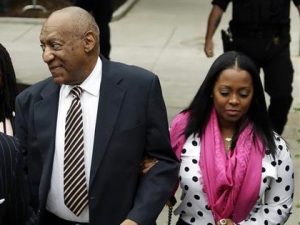 Bill Cosby has made two distinctly different splashes in American popular culture. He starred in “The Cosby Show” (1984-92), a sitcom that was America’s most highly rated television show for five consecutive years. Then, his trial for sexual assault in the spring of 2017 became the most recent “trial of the century.” Ironically, the immense success of the former prevented the latter from attracting the attention many had predicted.
Bill Cosby has made two distinctly different splashes in American popular culture. He starred in “The Cosby Show” (1984-92), a sitcom that was America’s most highly rated television show for five consecutive years. Then, his trial for sexual assault in the spring of 2017 became the most recent “trial of the century.” Ironically, the immense success of the former prevented the latter from attracting the attention many had predicted.
As for “The Cosby Show,” it featured the Huxtables, a fictional upper middle-class African American family living in a brownstone in Brooklyn Heights. Cliff Huxtable, played by Cosby, was a jolly obstetrician, while his wife Clair Huxtable was a successful attorney. The Huxtables has four daughters and one son, and although each episode had its tender tensions, they always dissipated by the end of the hour. “The Cosby Show” was about a happy, loving ideal family, and Cliff Huxtable became the nation’s fantasy father. When TV Guide ranked the 50 greatest dads in television history, the magazine named Cliff Huxtable “The All-Time Greatest Dad.”
While the show rarely addressed race directly, it was what the show left unsaid that was important. Cosby and the show’s producers consciously set out to “recode blackness.” They turned stereotypes upside-down by presenting a tightly-knit African American family that was affluent, had friends and neighbors of different races, and was headed by a married couple, with each member belonging to a learned profession. In the midst of the Reagan-Bush years, Americans took to the portrayal, and it, if only for a moment, obfuscated the nation’s shoddy racist inequality.
When twenty-five years later in time two dozen women claimed Cosby had drugged, sexually assaulted, and raped them, America was shocked. When Cosby went on trial in the spring of 2017 for sexually assaulting Andrea Constand, many thought the public would be obsessed with the proceedings. Coverage of the trial seemed likely to equal that for celebrities such as O.J. Simpson in 1994 and Michael Jackson in 2005. Trials of the rich and famous, after all, have been pop cultural delights since the days of the penny dailies in the early nineteenth century.
For various reasons, the public’s fascination with the Cosby trial was less than expected. For one thing, the trial took place in Norristown, Pennsylvania rather than Los Angeles. Then, too, various distracting civil suits were spinning all around the criminal trial, and Judge Steven O’Neill allowed only one of thirteen willing accusers to testify that Cosby had assaulted them in the same way he had assaulted Constand. In the end, what could be more disappointing for a public seeking either exoneration or retribution than a mistrial? To this date, the identities of the jurors have remained secret, and nobody knows which or how many of the twelve thought Cosby was guilty or not guilty.
Beyond all this, it seems the public and media as well could not resolve the contradiction inherent in America’s “Greatest Dad” allegedly being a sexual predator. An extraordinarily successful pop cultural image from earlier in time made it difficult for Cosby’s real-life trial to become a media extravaganza. Throughout the trial, actress Keshia Knight Pulliam accompanied Cosby into court. Pulliam had long since stopped being the precocious Rudy Huxtable from “The Cosby Show,” but she rekindled memories of a loving family led by a wonderful father. One work of popular culture made it difficult for another to soar to its salacious, commercial zenith.
